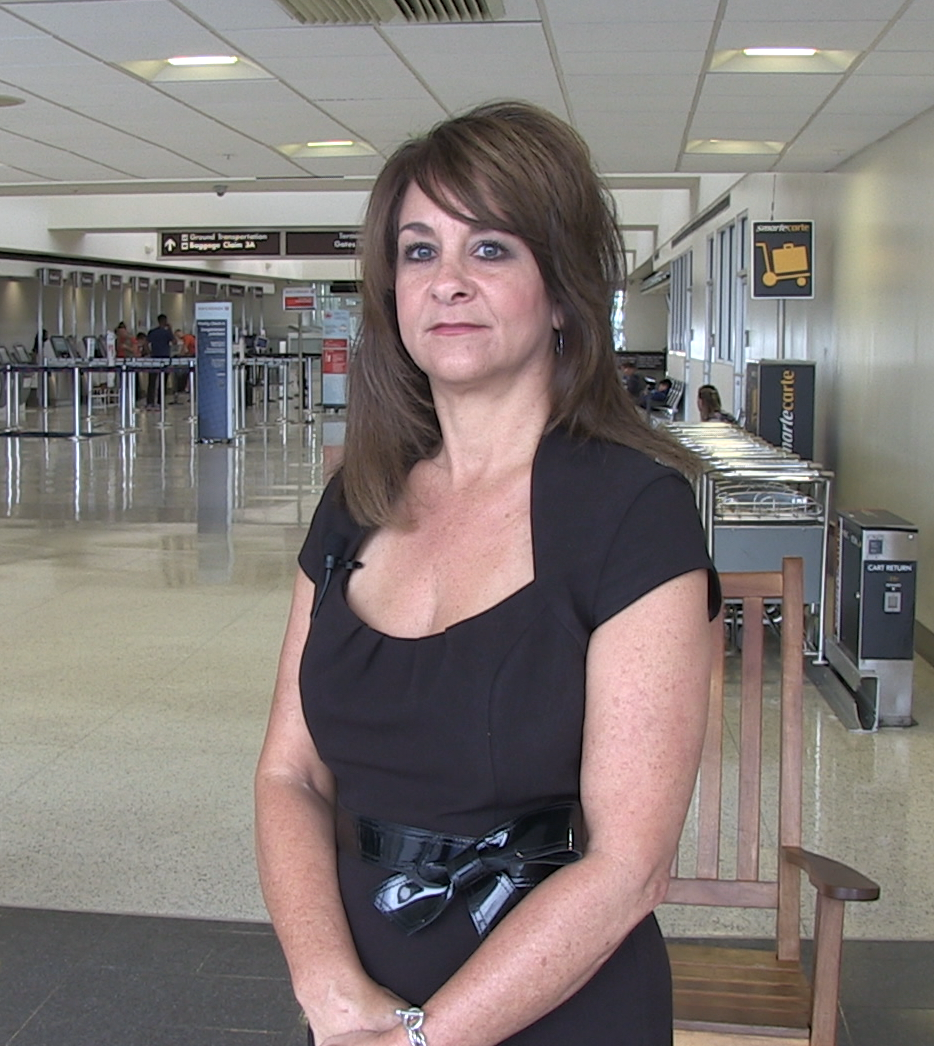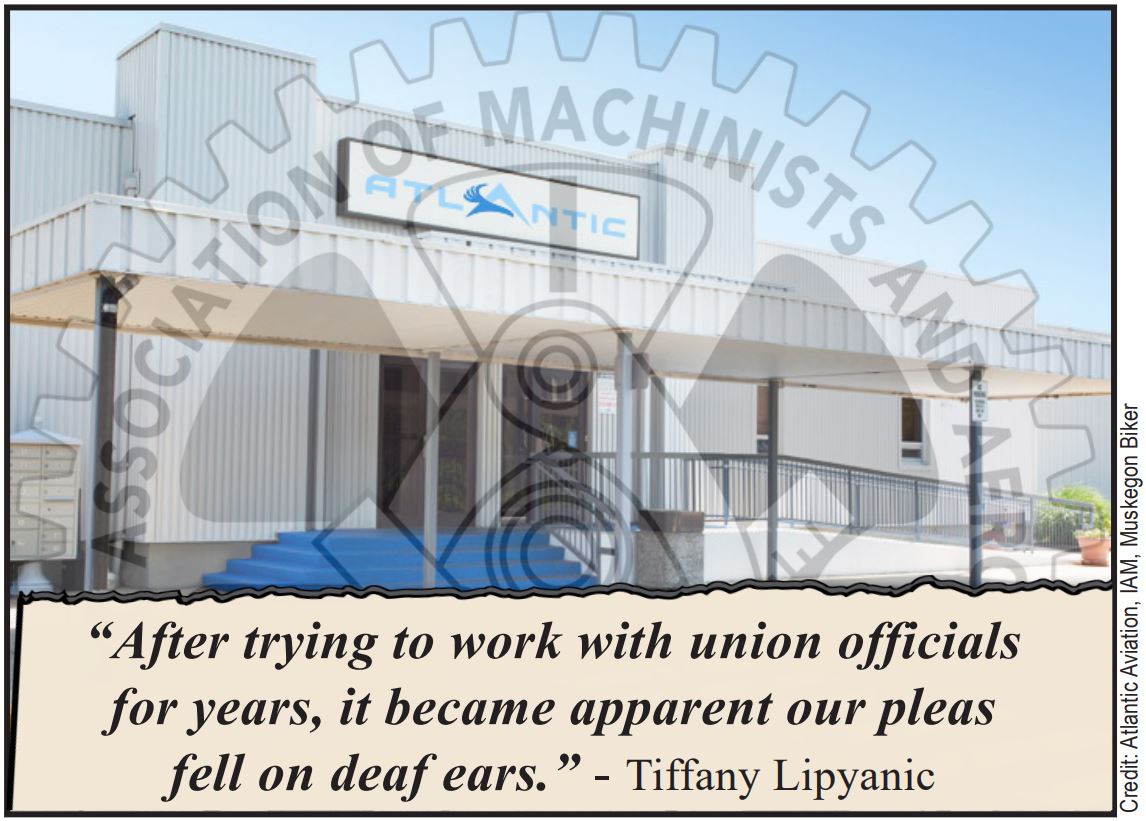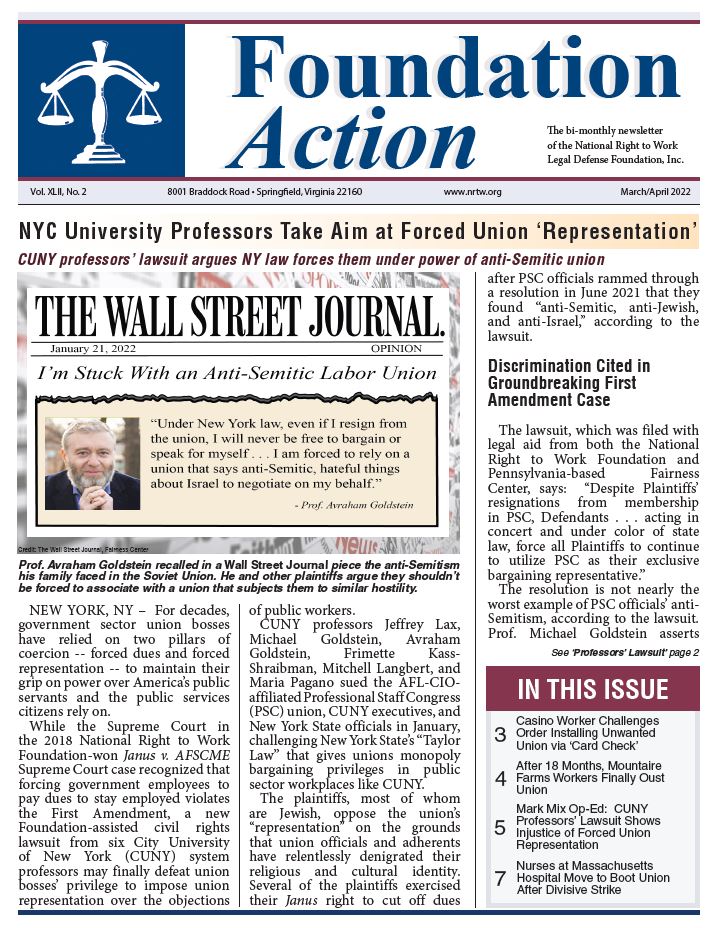South Jersey Bus Drivers Challenge Dues Trap Scheme in New Janus Lawsuit
The following article is from the National Right to Work Legal Defense Foundation’s bi-monthly Foundation Action Newsletter, July/August 2022 edition. To view other editions of Foundation Action or to sign up for a free subscription, click here.
Union officials concocted policy to stop drivers from ending union dues deductions
Tyron Foxworth followed union instructions to the letter when he tried to cut off IFPTE union dues late last year — but union bosses continued taking a cut of his pay.
CAMDEN, NJ – National Right to Work Foundation attorneys continue to defend the landmark 2018 Janus v. AFSCME U.S. Supreme Court decision, helping workers across the country in fighting union boss schemes that restrict when public employees can exercise their right to cut off dues to a union they oppose.
Foundation attorneys are now aiding a group of drivers for the South Jersey Transportation Authority (SJTA) who are facing a particularly egregious example of union bosses’ resistance to the Supreme Court’s Janus ruling. According to the suit filed in May, International Federation of Professional and Technical Engineers (IFPTE) union bosses are refusing to stop dues seizures — overtly violating the provisions of the union cards workers signed when they initially authorized the dues.
In Janus, the Court declared it a First Amendment violation to force public sector workers to pay union dues or fees as a condition of employment. The Court also recognized that union officials can only deduct dues from the paycheck of a public sector employee who has voluntarily waived his or her Janus rights.
In their federal civil rights lawsuit, SJTA drivers Tyron Foxworth, Doris Hamilton, Karen Burdett, Karen Hairston, Ted Lively, Arlene Gibson, and Stanley Burke assert that IFPTE union officials violated their Janus rights by seizing dues from their paychecks after their dues deduction revocations should have been effective.
The drivers’ lawsuit says they signed forms indicating they could ask that dues deductions stop, but that such requests would not be effective until either the January or July following the request. The suit notes that currently union officials are ignoring those terms of the dues deduction cards and continue to deduct money despite the drivers’ objections.
IFPTE Union Siphoned Dues in Contradiction to Signed Documents
All of the plaintiffs submitted letters to SJTA officials between October and November 2021 requesting that IFPTE dues deductions cease. They expected the deductions to stop in January 2022, as the cards they signed provided. But, the lawsuit notes, “each Plaintiff had union dues seized from their wages after January 1, 2022 despite providing a notice of withdrawal prior to that date.”
The IFPTE’s monopoly bargaining contract with SJTA restricts workers’ dues revocation requests to only July, clearly at odds with the cards the drivers signed. Union officials never informed the drivers of this restriction or asked for their consent to it.
“These South Jersey Transportation Authority drivers are just the latest in a long line of Foundation-backed public workers who have discovered, after trying to dissociate from an unwanted union, that union officials brazenly locked them in restrictive dues schemes without even a whiff of consent,” National Right to Work Foundation President Mark Mix told Politico after the suit’s filing.
Foundation attorneys argue in Foxworth and his colleagues’ lawsuit that IFPTE union officials, by taking union dues after January 1, 2022, without the workers’ consent, “violate Plaintiffs’ First Amendment right to free speech and association.” The drivers seek a judgment making union officials permanently stop deducting dues from their wages, and return all dues already taken from their paychecks illegally.
Drivers Demand Return of Dues Union Seized Unconstitutionally
“IFPTE officials clearly value union dues revenue more than the rights of the workers they claim to ‘represent.’ Not only are those officials rebuffing clear notice from workers that they no longer want to support the union’s activities, but they’re enforcing a restrictive dues policy about which workers had absolutely no knowledge,” commented National Right to Work Foundation President Mark Mix.
“Janus was unambiguous: A worker’s affirmative consent is required for any kind of dues deductions to occur, and that standard was clearly not met here.”
Foundation Client Wins $5.1 Million Verdict After Union Boss-Instigated Firing
The following article is from the National Right to Work Legal Defense Foundation’s bi-monthly Foundation Action Newsletter, July/August 2022 edition. To view other editions of Foundation Action or to sign up for a free subscription, click here.
Trial exposed emails advocating ‘targeted assassinations’ of union critics
Charlene Carter on her Foundation-won trial victory: “I am so humbled and thankful for today’s decision and for everyone who’s supported me these past five years.”
DALLAS, TX – Ex-Southwest Airlines flight attendant Charlene Carter prevailed in a federal jury trial in her lawsuit against the Transportation Workers Union of America (TWU) Local 556 union and Southwest. She charged both the company and union with illegally firing her for opposing the political activities of the union hierarchy, and with discriminating against her religious beliefs. Carter received free legal representation from National Right to Work Legal Defense Foundation staff attorneys.
A jury in the U.S. District Court for the Northern District of Texas awarded Carter $5.1 million in combined compensatory and punitive damages against TWU and Southwest for their respective roles in her unlawful termination.
“Today is a victory for freedom of speech and religious beliefs. Flight attendants should have a voice and nobody should be able to retaliate against any employee for engaging in protected speech against her union,” said Carter reacting to the victory.
Flight Attendant Called Out Union Officials for Their Political Activities
Carter resigned from union membership in 2013 but was still forced to pay fees to TWU Local 556 as a condition of her employment. The Railway Labor Act (RLA), the federal law that governs labor relations in the air and rail industries, permits the firing of employees for refusal to pay dues and preempts the protections that state Right to Work laws provide.
However, the RLA does protect employees’ rights to remain non-members of the union, to speak out against the union and its “leadership,” and to advocate for changing the union’s current “leadership.”
In January 2017, Carter, a pro-life Christian, learned that then-TWU Local 556 President Audrey Stone and other Local 556 officials used union dues to attend a political rally in Washington, D.C., which was sponsored by activist groups she deeply opposed, including Planned Parenthood.
Carter, a vocal critic of Stone and the union, sent private Facebook messages to Stone challenging the union’s support for political positions that were contrary to Carter’s beliefs, and expressing support for a recall effort that would remove Stone from power. Carter also sent Stone a message emphasizing her commitment to a National Right to Work law after the union had sent an email to employees telling them to oppose Right to Work.
After a meeting at which Southwest officials confronted Carter about her posts protesting union officials’ positions, the company fired Carter. In 2017 Carter filed her federal lawsuit, challenging the firing as a clear violation of her rights under two federal laws. She maintained that she lost her job because of her religious beliefs, standing up to TWU Local 556 officials, and criticizing the union’s political activities and how it spent employees’ dues and fees.
Ultimately, concluding an 8-day July trial, the federal jury agreed with Carter and her Foundation staff attorneys. In its verdict, the jury found in favor of Carter on all counts of the lawsuit, while awarding Carter $950,000 in damages against the TWU union local and more than $4 million in damages against Southwest.
Union Zealot Advocated ‘Targeted Assassinations” of Union Dissidents
In email communications unearthed and introduced at trial by Foundation staff attorneys, TWU union militants advocated for “targeted assassinations” of union dissidents and mocked Carter for being unable to stop her money from going toward union-backed causes she opposed.
Carter’s Foundation-backed lawsuit also revealed ugly examples of the hostility TWU officials and activists had for workers like Carter who spoke out against the incumbent union hierarchy. Foundation staff attorneys are preparing to counter already-announced appeals by both Southwest and TWU.
“This long-awaited verdict vindicates Ms. Carter’s fundamental right to dissent from the causes and ideas that TWU union officials support while forcing workers to bankroll that agenda,” commented National Right to Work Foundation President Mark Mix. “Verdicts like this show not only that one brave worker standing up to union bullies can make a difference, but also send a message to union bosses that their unlawful tactics will not go unpunished or unchallenged.”
Flight Attendant Battling Religious Discrimination Beats Union Attempt to End Case
The following article is from the National Right to Work Legal Defense Foundation’s bi-monthly Foundation Action Newsletter, July/August 2022 edition. Read here about how flight attendant Charlene Carter eventually won a jury verdict for $5.1 million. To view other editions of Foundation Action or to sign up for a free subscription, click here.
Judge rules flight attendant’s case against union & airline should proceed to trial
Case Cleared for Takeoff: Charlene Carter’s lawsuit against TWU union bosses for firing her over her religious beliefs and support for Right to Work is now going to trial.
DALLAS, TX – On May 5, a federal judge ruled that former Southwest Airlines flight attendant Charlene Carter’s case charging Transportation Workers Union (TWU) officials and Southwest management with firing her illegally because of her exercise of her religious beliefs will continue at the U.S. District Court in Dallas. In doing so, the judge rejected requests from TWU and Southwest that they be granted an early victory in the case.
The judge tossed arguments from Southwest Airlines lawyers that Carter lacks a “private right of action” to enforce her rights under the Railway Labor Act (RLA), and its arguments that her case concerned only a “minor” dispute over interpretation of the union contract, which is outside the District Court’s jurisdiction.
He also rejected TWU’s and Southwest’s contentions that an arbitrator’s findings in a grievance under their monopoly bargaining agreement should control the claims in this case.
Flight Attendant Called Out Union Officials for Their Political Activities
As a Southwest employee, Carter joined TWU Local 556 in September 1996. A pro-life Christian, she resigned from union membership in September 2013 after learning that her union dues were being used to promote causes that violate her sincerely held religious beliefs.
Although Carter resigned from union membership, she was still forced to pay fees to TWU Local 556 as a condition of her employment. State Right to Work laws do not protect her from forced union fees because airline and railway employees are covered by the RLA.
The RLA allows union officials to have a worker fired for refusing to pay union dues or fees. But it also protects employees’ rights to remain non-members of the union, to criticize the union and its leadership, and advocate for changing the union’s current leadership or removing the union altogether.
Carter sent TWU Local 556 President Audrey Stone Facebook messages sharply criticizing the union and its officials upon learning that they had used union dues to support political causes and events she opposed. The Court’s ruling noted that forced fees from objecting workers like Carter were used to fund such activities.
Carter took to social media to challenge Stone’s leadership and to express support for a recall effort that would remove Stone from power. Carter sent Stone messages affirming her commitment to both the recall effort and her support for a National Right to Work law after the union had emailed employees urging them to oppose Right to Work.
Carter was notified by Southwest managers that they needed to have a mandatory meeting as soon as possible about her personal “Facebook posts they had seen.” During this meeting, Southwest interrogated Carter about her posts and messages, as well as her Facebook messages to Stone opposing the union’s activities.
Carter explained her religious beliefs and opposition to the union’s political activities — opposition protected by the RLA. However, a week after this meeting, Southwest fired Carter.
In 2017, Carter filed her federal lawsuit with help from Foundation staff attorneys to challenge the firing as an abuse of her rights. Her suit asserts she lost her job because of her religious beliefs, her opposition to TWU Local 556 officials, and criticism of the union’s political activities and spending of employees’ dues and fees.
Federal Judge Rebuffs Union and Airline Attempts to End Case Early
“[H]aving determined that Carter has a private right of action under [the RLA] and that this case concerns a major dispute,” the federal judge assigned to the case ruled that genuine disputes of material fact exist and the case must proceed to trial.
“This decision is an important step towards long overdue justice for Charlene. The ruling rejects several attempts by Southwest and union officials to deny Ms. Carter’s right to bring this case in federal court to enforce her federally protected speech and association rights,” commented National Right to Work Foundation Vice President and Legal Director Raymond LaJeunesse.
General Motors Worker Forces UAW Bosses to Stop Seizing Dues for Politics
Illegal seizures came after multi-billion-dollar Big Labor political spending
A massive UAW embezzlement scandal didn’t stop UAW officials from ignoring at least two attempts by Roger Clemons to exercise his right to stop subsidizing union political activity.
ROCHESTER, NY – Even after a sweeping federal corruption probe that has resulted in jail sentences for at least 12 union executives, it seems some United Auto Workers (UAW) officials haven’t learned their lesson regarding misuse of worker funds.
Rochester General Motors employee Roger Clemons this January won a settlement forcing UAW officials at his plant to stop illegally funneling money from his paycheck into union politics. Clemons filed federal charges in September 2021 against UAW Local 1097 and the UAW’s international branch, after union agents ignored his requests to opt-out of funding the union’s political agenda. He received free legal representation from National Right to Work Foundation staff attorneys.
A Foundation-won settlement required UAW international and local officials to give back to Clemons all money that was deducted from his paycheck in violation of the Foundation-won CWA v. Beck Supreme Court decision. Beck forbids union officials from forcing workers under their control to fund union politics.
Because New York State lacks Right to Work protections for its private sector workers, union officials can legally force workers to pay a reduced amount of union dues under threat of termination. In Right to Work states, union membership and all union financial support are strictly voluntary.
UAW Chiefs Repeatedly Violated Worker’s Beck Rights
Clemons stated in his September 2021 charge against UAW Local 1097 officials that UAW officials had a history of flouting his Beck rights, failing to reduce his union dues even after he ended his union membership and became a “Beck objector” in October 2019. “Only after Mr. Clemons filed an [earlier] unfair labor practice charge . . . did the union comply with the requirements of the law,” the charge noted, detailing that union officials finally sent him rebate checks in June and July 2020 for excess dues they took from his paycheck.
However, UAW officials continued to create obstacles for Mr. Clemons’ Beck rights. The September 2021 charge asserted that despite Clemons renewing his Beck objection in October 2020, he then did not receive “a single rebate check or a reduction in the dues deducted from his wages” for almost a year.
Clemons also charged General Motors for its role in enforcing the illegal dues deductions.
The settlement now forbids UAW officials from “accept[ing] dues or fees which have been deducted from the paycheck of Roger Clemons, or any other Beck objector, which are in excess of the amount we can lawfully charge to Beck objectors.” UAW officials also have returned dues that they seized from Clemons above the reduced Beck amount.
Union officials devote enormous sums to political activity. A report the National Institute for Labor Relations Research (NILRR) released in 2021 revealed that union officials’ own Department of Labor filings show over $2 billion in political spending during the 2020 election cycle, primarily from dues-stocked union general treasuries. Another study found that actual union spending on political and lobbying activities likely topped $12 billion during the 2020 cycle.
Union Bosses Likely to Splash Cash on 2022 Midterm Elections and Beyond
“Rank-and-file workers should know they have a right to refuse to fund union politics, especially with union political spending in 2020 having approached record numbers and midterm elections coming up,” commented National Right to Work Foundation Vice President and Legal Director Raymond LaJeunesse. “Workers under UAW control, like Mr. Clemons, have special reason to be on guard, given the UAW’s perennial interest in politics, and because several UAW officials now find themselves behind bars for embezzlement and corruption.”
Atlantic Aviation Employees Win Freedom from Unwanted Union
Incompetent Machinists union bosses fly away to avoid worker vote
IAM union officials loafed around at Tiffany Lipyanic’s workplace for years, all the while siphoning dues from her and her coworkers. She’s thankful to the Foundation for aid in navigating the complex process to vote them out.
PHILADEPHIA, PA – Atlantic Aviation PNE, Inc. employees have freed themselves from unwanted union monopoly “representation” after filing a decertification election request with the National Labor Relations Board (NLRB). Tiffany Lipyanic, a line service technician, filed the petition to end the union’s monopoly bargaining powers for all workers at the Atlantic Aviation facility at Philadelphia Northeast Airport. International Association of Machinists (IAM) union officials then abandoned their “representation” rather than face an overwhelming vote against the union.
‘We Were Paying Union Officials and Got Nothing in Return’
Lipyanic and her colleagues received free legal assistance from National Right to Work Foundation staff attorneys in filing their petition for a vote to oust union officials. The petition, filed on February 15 by tire service and customer service representatives, was signed by more than twice the number needed to trigger an NLRB-supervised “decertification” secret-ballot election, after which union officials lose monopoly bargaining power if a majority of workers vote to remove them.
Rather than proceed to a vote, IAM District Lodge 142 and Local Lodge 1776 officials filed documents with the NLRB disclaiming their monopoly bargaining powers on February 28.
“After trying to work with union officials for years, it became apparent our pleas fell on deaf ears. We were paying union officials and got nothing in return, so we’re glad to finally be free of them,” Lipyanic commented. “Having the National Right to Work Foundation’s assistance gave us confidence in our journey to finally free ourselves from union bureaucrats that took our money and disregarded us at every turn.”
Foundation-Backed Rules Aid Workers in Removing Unpopular Union Bosses
This is the latest in a series of successful worker efforts to oust unwanted union officials aided by National Right to Work Foundation staff attorneys. Just since the beginning of 2021, Foundation attorneys provided legal assistance in well over 50 NLRB decertification efforts, which together sought to end union boss control of over 7,000 workers.
Recent Foundation efforts to break down union boss-created legal barriers to unseating unwanted union officials have allowed more workers to free themselves from unwanted union ranks. In 2020, following detailed formal comments submitted by Foundation attorneys, the NLRB adopted rules eviscerating union bosses’ ability to stop a decertification effort with “blocking charges,” i.e., accusations made against an employer that are often unverified and have no connection to workers’ desire to kick out unwanted union officials.
“Under the protection of a Right to Work law each individual worker can decide whether or not to join or financially support a labor union. Unfortunately, current law empowers union bosses in many states to use their monopoly bargaining status to force workers to pay up or be fired,” commented National Right to Work Foundation Vice President and Legal Director Raymond LaJeunesse.
“The Foundation is glad to have helped the workers at Atlantic Aviation exercise their right to free themselves of a union they oppose. But to better protect all workers’ freedom of association, Right to Work laws should be on the books in all states,” LaJeunesse added.
Indiana US Brick Employees Target ‘Successor Bar’ for Demolition
Over 70 percent of workers want Teamsters gone, but non-statutory policy prevents vote
Though Kerry Atkins and roughly 70 percent of his coworkers want to kick Teamsters bosses from their facility, the “successor bar” and other non-statutory “bars” could block a vote for years.
INDIANAPOLIS, IN – National Right to Work Foundation staff attorneys have made big strides in recent years for independent-minded workers who want to exercise their right to vote unpopular unions out of their workplaces.
The National Labor Relations Board’s (NLRB) adoption in 2020 of Foundation-backed reforms to the decertification process have made it significantly less difficult for workers to exercise their rights. But, there’s much more work to be done to eliminate contrived, union boss-friendly NLRB policies that stifle worker rights just so unwanted unions can stay entrenched.
Enter Kerry Atkins and his coworkers at US Brick in Mooresville, Indiana. With free Foundation legal aid they are fighting an NLRB policy called the “successor bar” that arbitrarily blocks employees’ right to vote out an unwanted union when management changes hands in a workplace.
Atkins filed a petition signed by his colleagues in December 2021, asking the NLRB to hold a vote on whether to decertify Teamsters Local 135 union officials. NLRB Regional Director Patricia Nachand ruled on February 9 that US Brick’s recent acquisition of the plant triggered the so-called “successor bar” and rendered the employee petition invalid.
NLRB-Invented Policy Traps Workers in Union They Strongly Oppose
Nachand blocked the vote even though, according to her own order, plant management has in its possession a parallel petition expressing disaffection with the Teamsters, which bears the signatures of about 70 percent of the employees.
The “successor bar” is a non-statutory policy invented by NLRB appointees that immunizes union officials from being voted out by employees for up to a year after management changes as a result of a sale, merger, or acquisition.
The National Labor Relations Act (NLRA), the federal law the NLRB is charged with enforcing, explicitly states that employees have a right to remove union monopoly “representation” they oppose. The “successor bar,” however, is found nowhere in the NLRA’s text.
The only “bar” to employees requesting a decertification election that is mentioned in the NLRA is a one-year restriction after employees certify a union in a secret-ballot vote. That the “successor bar” — which isn’t even in the NLRA — can stave off attempts to vote out a union for up to four years when combined with a “contract bar” makes it especially offensive to workers’ rights.
To make matters even worse, two different federal agencies — the NLRB and the Department of Justice — effectively worked together to impose the “successor bar” on Atkins and his coworkers. The Department of Justice in an antitrust complaint forced the former owner of the Mooresville brick facility to sell it to US Brick. The NLRB now says that event should be grounds for blocking the employees from ejecting a union they overwhelmingly oppose.
‘Successor Bar’ Disregards Desires and Experiences of Workers, Brief Says
Atkins’ Foundation attorneys have filed a Request for Review of Nachand’s order with the NLRB in Washington, D.C. It contends that the “successor bar” serves no purpose other than to block the will of rank-and-file employees, entrenching union bosses who ought to be accountable to the employees.
“The successor bar undermines the NLRA’s core purpose of employee free choice by disregarding employees’ actual desires and past experiences with their union representative,” the Request for Review argues.
Restriction Shows How NLRB-Invented Policies Stifle Individual Rights
“The NLRB-invented ‘successor bar’ is just one example of how the Board neglects its mandate to protect the rights of individual workers, including those opposed to forced union affiliation, just to protect union boss power,” observed National Right to Work Foundation Vice President Patrick Semmens. “The ‘successor bar’ not only overrides the statutory right of workers to vote out unions they oppose, but does so at the very moment when workers are most likely to reevaluate their union status: the turnover of the old management that perhaps was the reason for unionization in the first place.”
Teamsters Officials ‘Beck’ Down: Must Return Thousands in Dues Seized for Politics
Foundation-won settlement also forces union officials to stop threatening non-members
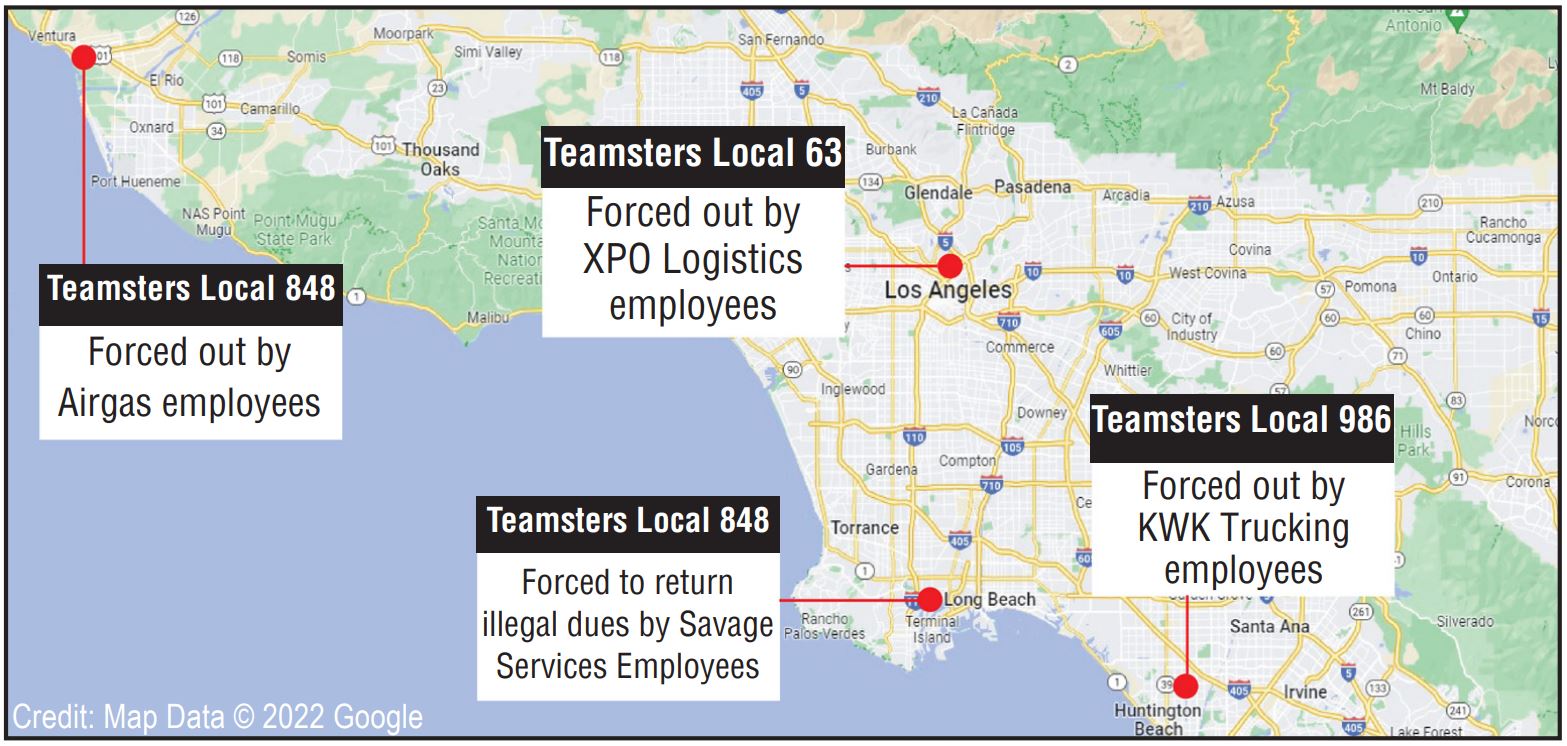
SoCal Shenanigans: Teamsters officials’ disrespect for rank-and-file workers and their rights led to multiple Foundation-backed employee actions against them in just the past year.
LOS ANGELES, CA – When Nelson Medina and about 60 of his coworkers at Savage Services in Long Beach tried to exercise their right as union non-members to opt out of funding Teamsters Local 848 officials’ political expenditures, Teamsters bosses responded with harassment, misinformation, and threats of termination.
Now, with free legal aid from the National Right to Work Foundation, they have won a settlement that required Teamsters honchos to pay back thousands of dollars in dues union officials seized in violation of workers’ rights under the Foundation-won CWA v. Beck Supreme Court decision.
Because California lacks Right to Work protections, even Golden State private sector workers who oppose a union’s presence in their workplace can be required to pay union dues or fees to keep their jobs. However, under the Beck decision, union officials can never require non-members to subsidize union political activity. Beck also entitles employees who have abstained from union membership to receive union financial disclosures.
Teamsters Bosses to Workers: Fund Union Politics or Be Fired
Medina originally filed charges against Teamsters officials for illegal dues practices in September 2021. The charges stated that he had sent Teamsters officials a letter on August 15 exercising his right to reject formal union membership and invoking his right under Beck to cut off dues deductions for union politics.
About a month after the letter, the charge noted, union officials informed Savage Services management by mail that if Medina and 12 fellow employees who also objected to full union membership did not complete membership applications and pay full dues for the month of September, the employer should terminate the employees before September’s final week.
The settlement, in addition to requiring Teamsters bosses to return nearly $6,000 in illegally taken dues to Savage Services employees, also mandated that union officials declare in a public notice that they “will not fail to provide non-member employees with a breakdown of dues and fees required for Beck objectors upon request.”
They also had to declare they “will not threaten employees who have raised Beck objections with termination for failing to complete a union application as a condition of employment.”
“That Teamsters Local 848 officials illegally siphoned money for politics from almost 60 Savage Services employees and threatened termination of those who dared to stand up for their rights demonstrates clearly that Teamsters officials prioritize power far above the employees they claim to ‘represent,’” commented National Right to Work Foundation Vice President and Legal Director Raymond LaJeunesse. “Based on the sheer number of employees in Medina’s workplace who received refunds as the result of this settlement, Teamsters officials apparently played fast and loose with the rights of all workers who objected to the union agenda.”
Foundation Attorneys Counter Teamsters Coercion Across Southern California
Last September, Foundation staff attorneys also aided Ventura, CA, Airgas employees in removing Teamsters Local 848 from their facility. After litigation that had lasted almost a year, as well as two submissions of petitions demonstrating a majority of workers at the plant wanted the Teamsters gone, union officials finally departed the plant. They did so just before the NLRB was slated to conduct a secret-ballot vote whether to remove the union at the plant, likely leaving to avoid an embarrassing rejection by the workers.
The string of Foundation-assisted worker victories over unwanted Teamsters officials in Southern California continued last year when Ozvaldo Gutierrez and his XPO Logistics coworkers forced Teamsters Local 63 union bosses out of their Los Angeles facility in October.
Union Bosses Caught Red-Handed Illegally Taking Dues from Charter School Teacher
California union officials backed off anti-Janus deductions after Foundation action
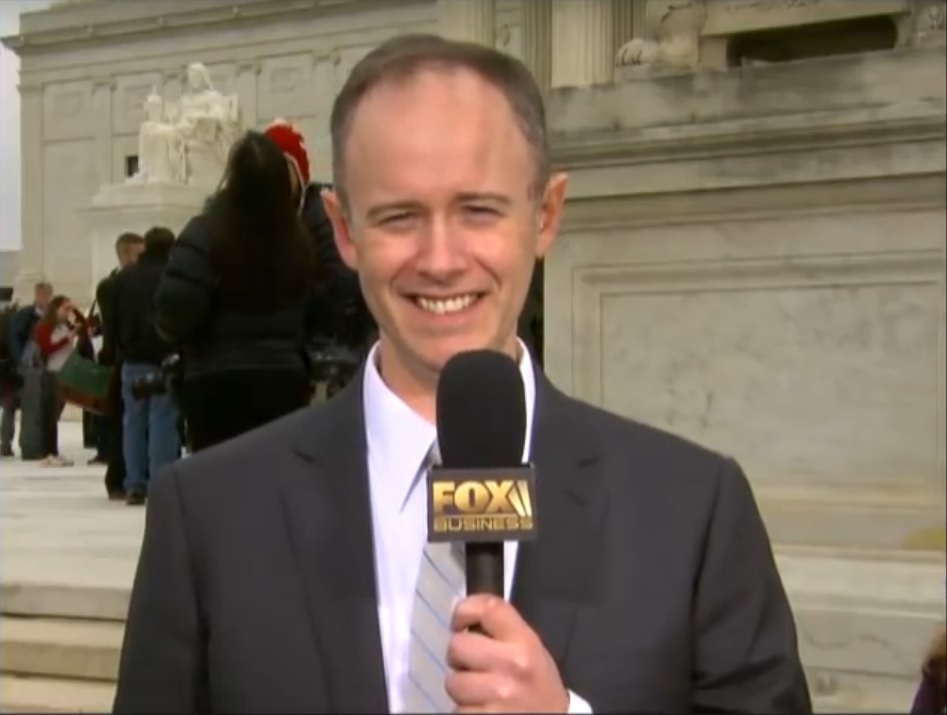
Foundation staff attorney Bill Messenger successfully argued Janus at the Supreme Court. But enforcing the landmark First Amendment victory is an ongoing battle.
LOS ANGELES, CA – A former teacher at Camino Nuevo Charter Academy in Los Angeles, California, is getting a refund of illegally seized union dues with free legal aid from the National Right to Work Legal Defense Foundation. The refund came after Foundation staff attorneys sent a letter to officials with the Camino Nuevo Teachers Association, an affiliate of California Teachers Association, threatening legal action for violating the teacher’s First Amendment rights.
Natalie Bahl, who was a teacher at Camino Nuevo Charter Academy up until recently, attempted to exercise her right as a public employee not to pay any union fees. Ms. Bahl notified the union of her decision in a mass email to several union officials, which reportedly also prompted other teachers to make similar requests. Her email was sent before the union-designated “window period” closed for teachers to revoke their authorization for deducting union dues.
Despite the timely request, Ms. Bahl realized a few months later that union dues were still being deducted from her paycheck. When she asked union officials about it, they suddenly claimed she missed her window period for dues revocation.
At that point, Ms. Bahl reached out to National Right to Work Legal Defense Foundation staff attorneys, who sent a letter demanding a refund of union dues collected in violation of Bahl’s First Amendment rights. Rather than face a potential federal civil rights lawsuit, CNTA union officials refunded all dues taken from Bahl from the time of her request until she left the school’s employment to further pursue her own education.
Union Officials Refuse to Learn Their Janus Lesson
In the Foundation-argued Janus v. AFSCME U.S. Supreme Court case, the Court recognized that forcing public sector workers to pay union dues or fees as a condition of employment violates the First Amendment. The Justices also ruled that public employees must opt in with affirmative consent to any union payments before money can be taken from their paychecks.
Since winning the 2018 Janus Supreme Court decision, Foundation staff attorneys have scored victories across the country for public employees seeking to enforce their First Amendment rights under the Janus decision. For example, Foundation staff attorneys recently successfully defended a public school teacher in Harford County, Maryland, from whom union bosses illegally seized dues for months despite two letters to the local AFSCME affiliate exercising her right to resign union membership and end all dues deductions from her pay.
“Teachers and other public sector workers have Janus rights under the First Amendment and should immediately contact the Foundation for free legal assistance if they believe their rights have been violated,” said National Right to Work Foundation Vice President Patrick Semmens. “Unfortunately we continue to see that even when public employees comply with arbitrary union-created policies designed to stifle their First Amendment rights, union officials still brazenly ignore Janus in order to fill their coffers with union dues seized from employees.
Courageous Tennessean Wins Big in Union Discrimination Suit
The following article is from the National Right to Work Legal Defense Foundation’s bi-monthly Foundation Action Newsletter, May/June 2022 edition. To view other editions of Foundation Action or to sign up for a free subscription, click here.
LIUNA union official disparaged faith of employee and sent her priest ‘remedial church readings’
“This is one of the greatest things I’ve ever done in my life,” Frame said of her victory over LIUNA officials. For more on her case watch our video with Frame’s Foundation attorney at the bottom of this page.
CLARKSVILLE, TN – Workers who seek free legal aid from the National Right to Work Foundation often stand up for their rights despite real threats union bosses make on their livelihoods and their ability to provide for their families. For Tennessee employee Dorothy Frame, who just won a major settlement against Laborers International Union (LIUNA) officials with Foundation aid, all that and more was at risk. She believed LIUNA officials’ forced-dues demands violated her religion.
Frame filed a complaint against LIUNA in November 2021, asserting that union officials illegally discriminated against her by forcing her, in violation of her Catholic beliefs, to fund the union’s activities through mandatory union dues payments. Frame voiced her religious objections to the union’s political activities, but union officials repeatedly rejected and ridiculed her request for a religious accommodation.
Under the settlement, as a condition of dismissing the lawsuit against LIUNA, union officials paid Frame $10,000 in damages. The settlement also required the LIUNA officials’ attorney to send an apology letter to Frame for the union’s inappropriate conduct.
Frame first requested a religious accommodation in 2019, when she sent “a letter informing [LIUNA] of the conflict between her religious beliefs and the requirement that she join or pay the Union.”
Tennessee has a Right to Work law ensuring that private sector workers in the state cannot be compelled to pay dues as a condition of employment. But Fort Campbell, the location of Blanchfield Army Community Hospital where Frame worked, may be an exclusive “federal enclave” not subject the state’s Right to Work law.
LIUNA Officials: Worker’s Religious Objections to Forced Dues ‘Illegitimate’
Frame’s former employer, J&J Worldwide Service, maintains a union monopoly contract with LIUNA union bosses that forces employees to pay union dues or fees to keep their jobs.
Frame’s July 2019 letter included a message from her parish priest supporting her request for a religious accommodation. Federal law prohibits unions from discriminating against employees on the basis of religion, and requires unions to provide accommodations to workers who oppose dues payment on religious grounds.
Instead, LIUNA officials denigrated her beliefs. In addition to demanding she provide a “legitimate justification” for why her conflict with the union’s activity warranted a religious accommodation, a union lawyer claimed in a letter to Frame that her understanding of her faith was inferior to his own understanding of her faith. He even closed the letter by sending Ms. Frame and her priest remedial church readings.
Frame subsequently filed a discrimination charge against LIUNA with the Equal Employment Opportunity Commission (EEOC) in December 2019. Even after EEOC proceedings continued and Frame’s attorneys sent letters showing the conflict between the union’s stance and her religious views, union officials still refused to accommodate her beliefs and refused to return money they took from her paycheck after she requested an accommodation.
Ultimately, the EEOC issued Frame a “right to sue” letter leading to her federal anti-discrimination lawsuit, filed by Foundation staff attorneys, resulting in her victory.
“Despite being targeted with years of bullying and discrimination by LIUNA officials, Ms. Frame refused to forsake her religious beliefs and stood firm for her rights,” commented National Right to Work Foundation President Mark Mix. “She has now prevailed decisively against LIUNA’s illegal attempt to force her to choose between remaining true to her beliefs and staying employed.”
Forced-Dues Privileges Open Door for Union Discrimination against Workers
“The National Right to Work Foundation is proud to stand with principled workers like Ms. Frame. Big Labor’s government-granted privilege to force rank-and-file workers to support union boss activities creates a breeding ground for malfeasance and anti-worker abuse,” Mix continued. “No American worker should have to pay tribute to a union they oppose just to keep their job, whether their objections are religious or otherwise.”
Full Foundation Action March/April 2022 Newsletter Now Online
All articles from the March/April issue of Foundation Action are now on the website.
In this issue:
- NYC University Professors Take Aim at Forced Union ‘Representation’
- Casino Worker Challenges Order Installing Unwanted Union via ‘Card Check’
- After 18 Months, Mountaire Farms Workers Finally Oust Union
- CUNY Professors’ Lawsuit Shows Injustice of Forced Union Representation
- Nurses at Massachusetts Hospital Move to Boot Union After Divisive Strike
Recent articles can be found here. To sign up for a free copy of the newsletter via mail please see the form at the bottom of this page.


